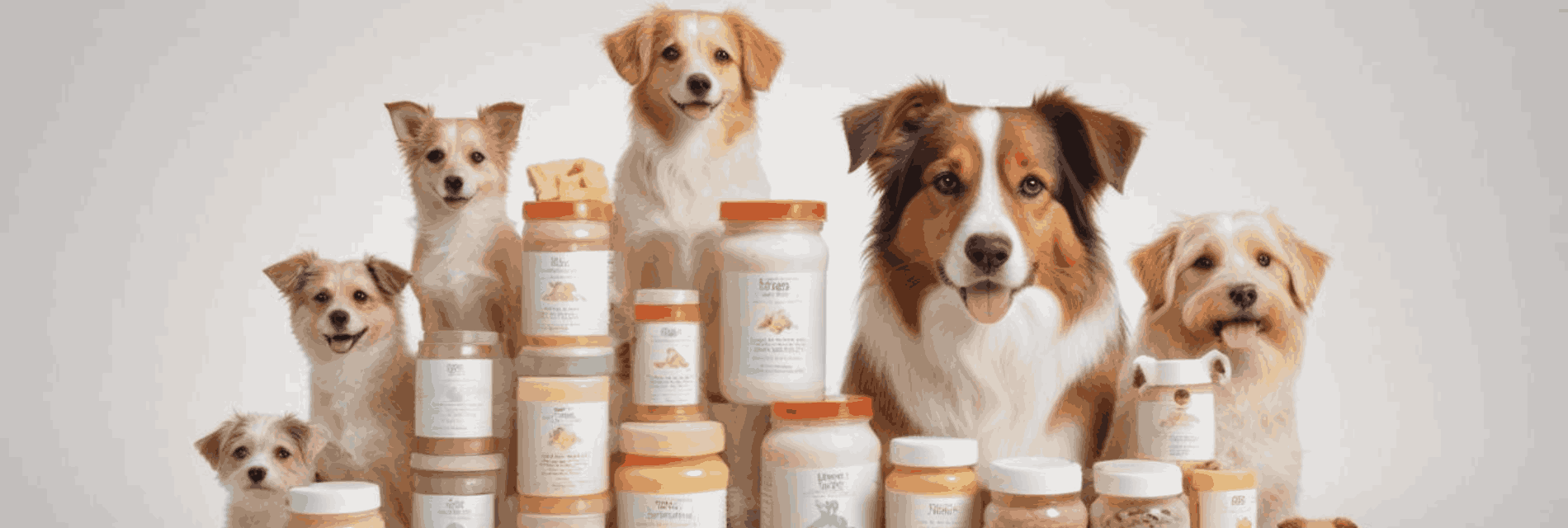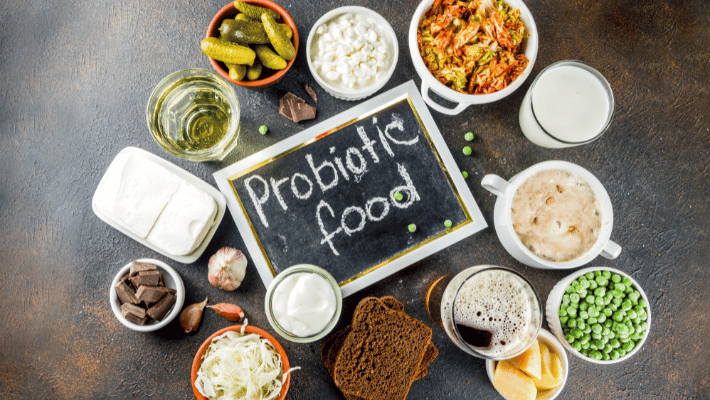Everything You Need To Know About Best Probiotics For Dogs


Does your pup suffer from occasional tummy troubles? Do they have itchy skin, or is their coat looking a little dull and rough? You might be surprised to learn that the answer to all these issues is probiotics! What is probiotics, you ask?
Well, probiotics are tiny, live microorganisms that provide numerous health benefits to our fur babies. From aiding digestion to boosting the immune system, probiotics are like little superheroes for your dog’s gut.
In this comprehensive guide, we’ll delve into everything you need to know about best probiotics for dogs, from their potential benefits to choosing the best source of probiotics for their dogs. So dive in.
What Are Probiotics?

Probiotics are live microorganisms consisting primarily of bacteria and sometimes yeast. They are quite similar to the beneficial microorganisms found in a dog’s gut and provide a lot of health benefits when consumed or applied topically. Consequently, probiotics are often referred to as “good” or “friendly” bacteria because they help keep our dog’s guts healthy.
How Do Probiotics For Dogs Work?
To understand how the best probiotics for dogs work, you first need to know about the gut microbiome, also known as gut microflora and gut microbiota. It refers to the trillions of microorganisms that live inside our dog’s intestines, particularly the large intestine. These microscopic organisms include bacteria, fungi, viruses, and even some parasites.
While some of these microbes can be harmful, the vast majority are beneficial or benign. They form a complex miniature ecosystem inside a dog’s gut and play a crucial role in your dog’s overall well-being. Another thing to note is that each dog’s gut microflora is unique to them. In puppies, gut microbiomes start to develop even before birth. Post-birth, factors like diet, medication, exposure to the environment around them, and even age play a crucial role in shaping a dog’s gut microbiome.
For a better understanding, you can think of your dog’s gut microbiome as a zoo with many different animals. There are the good guys, like the probiotic bacteria and some not-so-friendly ones.
Ideally, there are more good bacteria than harmful bacteria, and they keep things running smoothly. But sometimes, factors like stress, antibiotics, poor-quality diet, and dietary changes can disrupt and break down the delicate balance of a dog’s gut microbiome. This is known as dysbiosis.
There are three types of dysbiosis:
- Increase in the number of potentially harmful bacteria
- Loss of overall bacterial diversity
- Decrease in the total number of beneficial bacteria present in the gut
In all these situations, Probiotics come in handy. They contribute live, beneficial microbes to the gut and act like reinforcements for the good bacteria in your dog’s gut. By doing so, probiotics bring balance to this microbial world.
What Are The Different Strains of Probiotics?

Probiotics contain a variety of beneficial bacteria. However, the most common strains of probiotics belong to two main groups or genera: Lactobacillus and Bifidobacteria. Let’s take a closer look:
Lactobacillus
This is a large and diverse group of lactic acid bacteria commonly found in fermented foods like yogurt, kimchi, and sauerkraut. Some of the well-known Lactobacillus strains used in probiotics include:
- Lactobacillus acidophilus: This strain may help with diarrhea, lactose intolerance, and some respiratory issues.
- Lactobacillus casei: May support the immune system and aid digestion.
- Lactobacillus plantarum: May improve gut health and potentially reduce allergy symptoms.
Bifidobacterium
Another prominent group, Bifidobacterium are dominant bacteria in the gut of healthy infants. Some common Bifidobacterium strains in probiotics include:
- Bifidobacterium bifidum: May benefit digestive health and immune function in infants.
- Bifidobacterium longum: May help with constipation, diarrhea, and irritable bowel syndrome (IBS).
- Bifidobacterium breve: May improve gut health and potentially reduce the risk of certain infections.
What Are The Benefits of Probiotics For Dogs

Probiotics offer a range of benefits for dogs, making them an invaluable addition to their diet. Some of these benefits are:
Promotes a healthy digestive system
Best Probiotics for dogs help maintain a balanced gut flora by increasing the population of good bacteria. This aids in the digestion and absorption of nutrients and can be particularly beneficial for dogs with digestive issues such as diarrhea or constipation.
Supports the immune system
In addition to digestive health, best probiotics for dogs also play a crucial role in supporting the immune system of dogs. Approximately 70% of a dog’s immune system is located in their gut, and probiotics help strengthen this system by colonizing the dog’s gut with beneficial bacteria.
These bacteria then compete with the harmful bacteria for resources and space. By doing so, they help maintain a balanced and healthy gut flora and prevent the overgrowth of harmful bacteria. A healthy gut flora supported by probiotics boosts a dog’s immune system by reducing inflammation and fending off infections and illnesses.
Strengthens Gut Barrier
A healthy gut lining acts as a barrier against harmful toxins and bacteria. When the gut microbiome is disrupted, the gut barrier can become weak, allowing these toxins to enter the bloodstream and potentially contribute to skin issues. Best Probiotics for dogs may help strengthen the gut barrier, preventing toxins from reaching the skin and promoting overall skin health.
Improves skin health
Although research is ongoing, some studies suggest that there is a connection between gut health and coat and skin health in dogs. According to experts, a dog’s gut microbiome has a significant impact on its overall health, including skin and coat health.
For instance, a imbalance in a dog’s gut microflora, also known as dysbiosis can cause inflammation all over their body. This can potentially lead to skin problems like allergies or dermatitis in dogs. Probiotics may help restore balance in the gut, reducing inflammation and promoting healthier skin.
Enhanced nutrient absorption
A healthy gut microbiome can aid in the absorption of essential nutrients that contribute to healthy skin and fur. Probiotics may help ensure your dog gets the nutrients it needs for a shiny coat and healthy skin.
Helps in stress management
Just like us, our dogs also experience stress and anxiety due to many reasons. This includes lack of or disruption in routine, moving to a new place, and changes at home to name a few. All these factors can trigger chronic stress in dogs, which, in turn, disrupts the balance of their gut microbiome. This can cause health issues such as indigestion and diarrhea. Probiotics, by promoting the growth of beneficial bacteria in the gut, can help restore balance in the gut microbiome.
What Are The Main Sources Of Probiotics For Dogs?

There are two main sources of probiotics for dogs: natural or homemade sources and probiotic supplements for dogs. Read on to learn more about these sources of probiotics for dogs.
Natural Sources Of Probiotics
Natural sources of probiotics are foods or substances that contain live beneficial bacteria (such as Lactobacillus and Bifidobacterium) that can help maintain a healthy balance of gut flora. These sources include:
Dairy Products
Plain, unsweetened yogurt with live and active cultures is a good source of probiotics for dogs. Another good source is kefir which is a fermented milk drink containing live cultures and probiotics.
Another good option for probiotics for dogs is kefir cheese, a soft, crumbly cheese. It is made by straining the curds from kefir and has a slightly tangy flavor. Kefir cheese can be a tasty probiotic treat for dogs. As with other fermented dairy products, introduce it gradually in small amounts.
Fermented Vegetables
Certain fermented vegetables can be a natural source of probiotics for dogs. These include kimchi, which is a spicy fermented cabbage dish and a probiotic powerhouse. But due to its spiciness, it’s not suitable for all dogs. If you do decide to offer some, make sure it’s well-rinsed to remove excess spice, and offer only a very small amount as an occasional treat.
Sauerkraut is another fermented cabbage dish made using a process called lactic acid fermentation. For this, the shredded cabbage is layered with salt. The salt draws out water from the cabbage, creating a brine that submerges the cabbage. Then, the salted cabbage is left to ferment. While this dish is rich in probiotics, it is also high in salt content, which is why only offer this in small quantities to your dog.
While not as common, some other fermented options like natto (fermented soybeans) or tempeh (fermented soybeans and grains) might be suitable for dogs in very small quantities. However, it’s always best to consult your veterinarian before introducing any new food, especially fermented ones.
Probiotics Supplements
Probiotic supplements offer a convenient and concentrated source of beneficial bacteria for dogs. They come in various forms, like capsules, powders, and chewable treats. When it comes to choosing a probiotic supplement for your dog, there are several top-rated options available in the market. These are:
Purina Pro Plan FortiFlora Probiotic Supplement Powder
This supplement powder from Purina is rated no.1 by veterinarians for supporting digestive health in dogs. It is composed of a safe and quality-tested probiotic strain that has been proven to promote normal gut microbiome in dogs. It is available in an easy-to-use sachet and a chewable tablet for dogs, making it convenient for you to administer to their furbabies.
Zesty Paws Probiotic Bites Pumpkin Flavored Soft Chews Gut Flora & Digestive Supplement for Dogs
These pumpkin-flavored soft chew supplements for dogs contain six active strains of probiotics. These are Lactobacillus acidophilus, Lactococcus lactis, Lactobacillus fermentum, Lactobacillus plantarum, Lactobacillus brevis and Bacillus subtilis DE111.
Inactive ingredients present in this supplement include Coconut Glycerin, Flaxseed, Garbanzo Flour, Mixed Tocopherols (a preservative), Natural vegetable Flavoring, Natural Flavor (from Oregano, Flaxseed and Plum), Palm Oil, Papaya, Pea Flour, Pumpkin, Rosemary Extract, Sunflower Lecithin, Tapioca Flour.
As the name suggests, the pumpkin flavor is a key feature of this soft chew. So, if your dog loves pumpkins, this will be perfect for them. Moreover, this soft chew supplement is suitable for dog breeds of all sizes (small, medium, and large).
VetriScience Vetri Mega Probiotics Capsules
If you are looking for a probiotic supplement to support your dog’s daily digestive health, then these capsules from Vetriscience can be the right fit for you. The active strains of probiotics present in the Vetri Mega Probiotics capsule are Lactobacillus, Bifidobacterium, and Streptococcus.
Each capsule contains 7.5 billion CFU, which is highly potent and, therefore, quite effective. Prebiotics such as fructooligosaccharides are also present. You can give this capsule to your furbaby on a daily basis as an addition to their homemade or commercial diet.
Profivex Probiotics 5-Strain Pork Pet Digestive Health Probiotic, Prebiotic
The Profivex Probiotics supplement for dogs, available in both powder and soft chew form, is designed to promote a healthy digestive and immune system. It contains five active strains of probiotic bacteria: Lactobacillus acidophilus, Enterococcus faecium, Bacillus plantarum, Bacillus coagulans, and Bifidobacterium bifidum and prebiotics like FOS (Fructooligosaccharides).
In addition, other ingredients present in Profivex Probiotics include crude fiber of 2.5%, 20% moisture content, desiccated pork liver powder, rice flour, sweet potato powder, and Bromelain derived from pineapples. Each scoop and soft chew also contains 5 billion CFUs.
How To Choose The Best Probiotics For Dogs

When choosing a source of probiotics for your dog, you need to ensure that it will suit your furbaby’s specific needs. Here are some guidelines to help you select the right probiotics for your dog:
Take a look at the active ingredient
Firstly, look for products that contain the specific strains of bacteria that have been proven to be beneficial for dogs, such as Lactobacillus acidophilus or Bifidobacterium animalis.
Check For Potency
It’s also important to check the potency and viability of the probiotics. Look for products that guarantee a high number of live bacteria at the time of consumption to ensure maximum effectiveness. If you are buying a probiotic supplement, then look at the label to check the specific probiotic strains and their CFU (colony-forming units) count. The strains should be tailored to canine health.
Consider the form of the probiotics.
Probiotics are available in various forms, such as capsules, powders, and chews and dietary sources like yogurt, miso, and kefir. You should choose a form that is convenient for both you and your dog.
Opt for Reputable and Vet Formulated Products
Lastly, always opt for reputable brands that have a good track record of producing high-quality probiotic supplements for dogs. When in doubt, you should always for products that are formulated by veterinarians and approved by the veterinary field.
Also, make sure the probiotic has been third-party tested for quality assurance. Reading reviews and seeking recommendations from trusted sources can help you make an informed decision.
Wrapping Up
Probiotics have emerged as a powerful tool for promoting canine health and well-being. From supporting digestive health to boosting the immune system, these beneficial bacteria offer a range of benefits for dogs. By understanding the benefits, how they work, and the different types available, you can make informed decisions when it comes to choosing and incorporating probiotics into your dog’s diet.
Whether you opt for a probiotic supplement or natural sources of probiotics, always prioritize your dog’s health. Consult with your veterinarian to determine the best probiotic option for your furry friend and start incorporating it into their daily routine. Your dog will thank you for it!
Read Also









Leave A Comment